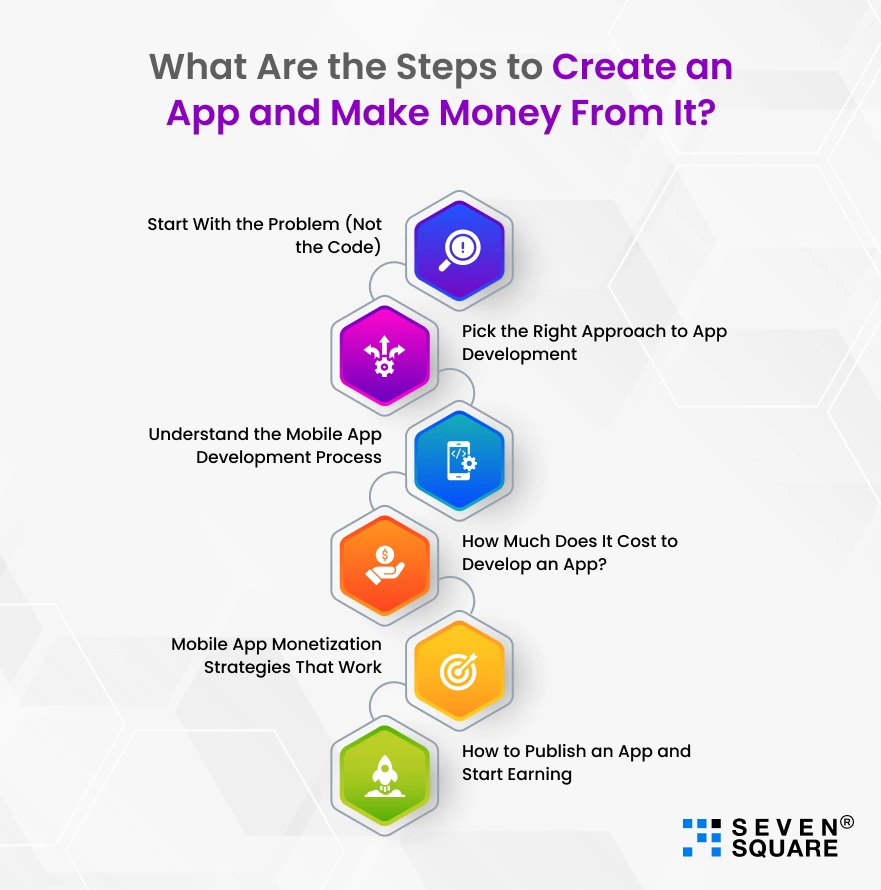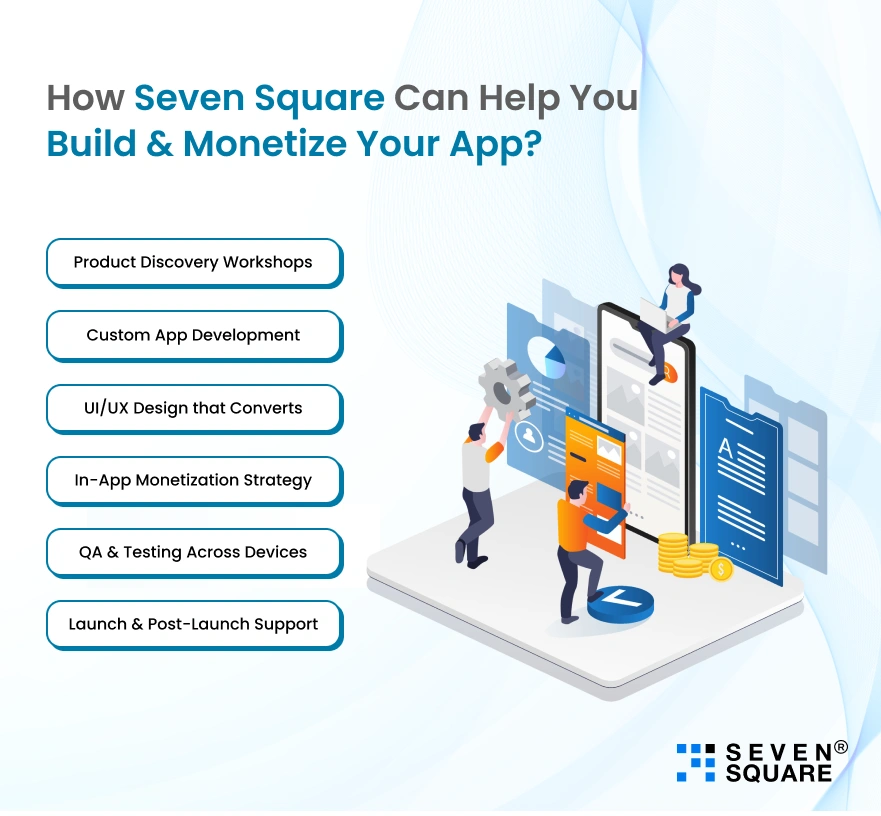Ever had an app idea that just wouldn’t leave your head?
Maybe you spotted a gap in the market.
Maybe you saw an app that frustrated you and thought, “I could do better.”
But the moment you search “how to create an app” or “how to make money from apps,” you’re met with expensive dev quotes and conflicting advice.
This blog is for you, a founder, or someone just curious but serious.
At Seven Square, we’ve built apps for startups and enterprises across industries ecommerce, fintech, healthcare, logistics, you name it.
Wondering how to create an app and make money? We are here for you.
Our development team will give an honest walkthrough of how to build an app and make money in 2025.
What Are the Steps to Create an App and Make Money From It?

Are you wondering how to make money from apps?
Then you need to understand the procedure of app development for beginners given below.
Step 1: Start With the Problem (Not the Code)
Every great app starts with a real problem.
The ones that fail?
Often started with a “cool feature” idea.
If you’re building an app because you saw someone raise millions with something similar, stop right there.
Build because you deeply understand the pain you’re solving.
Ask yourself:
- Who will use this app?
- What specific moment or task are you making easier for them?
- Why does this problem exist today?
You don’t need to know how to code yet. You need clarity.
Step 2: Pick the Right Approach to App Development
The truth? There are many ways to build your app. Here’s a breakdown:
1. No-Code/Low-Code Builders
If you want to build fast and validate quickly, go for no-code tools. This works best for MVPs.
- Best free app builder to create and monetize apps: Adalo, Glide, and FlutterFlow.
- Perfect for testing your app development process without heavy investment.
2. Custom App Development
If you’re thinking long-term and need flexibility, security, and performance, go custom.
Our team at Seven Square has helped founders like you build robust mobile apps from scratch.
- We use the right mobile app development tools depending on the project Flutter, React Native, Swift, Kotlin, and others.
- Whether it’s Android app development or iOS app development, we map out the architecture before writing a line of code.
Custom means control. And that control is what lets you scale.
Step 3: Understand the Mobile App Development Process
Don’t overcomplicate this. Here’s our simplified version:
- Discovery Workshop : We define the problem, audience, and goals.
- Wireframing : Sketching user flows and app structure.
- UI/UX Design : Clean, intuitive interfaces tailored to your users.
- Development : The codebase starts here. Backend, frontend, integrations.
- Testing : Manual and automated testing across devices.
- Deployment : The app is published to the App Store or Play Store.
- Post-Launch Support : Real users = real feedback = fast iterations.
This isn’t a theory. It’s how we’ve shipped apps with swift delivery, clear communication, and uncompromising quality.
Step 4: How Much Does It Cost to Develop an App?
One of the most Googled questions: “How much does it cost to develop an app?”
Well, it depends on:
- Complexity
- Features (chat, payments, GPS, etc.)
- Platform (iOS, Android, both)
- Backend requirements
- Design polish
Rough Development Costs
- MVP with no-code tools : $3,000 to $5,000
- Custom app development : $8,000 to $10,000
- Advanced, scalable apps : $12,000+
At Seven Square, we give the cost with clarity & no surprise invoices.
Step 5: Mobile App Monetization Strategies That Work
Now for the big question: How to make money from apps?
There’s no single answer. But here are tried and tested app monetization strategies:
1. Freemium Model
- Free core product, charge for advanced features. Think Spotify or Notion.
2. In-App Ads
- Great for free apps with high user volume.
- Free app monetization = Display ads, reward videos, interstitials.
- Use Google AdMob and Facebook Audience Network.
3. In-App Purchases (IAP)
- Used in gaming, learning apps, and wellness.
4. Subscription Model
- Recurring revenue. Best for SaaS, fitness, and content apps.
- Best app monetization strategies often include tiered pricing.
5. One-Time Purchase
- Flat-fee apps are rare but work for niche tools.
6. Affiliate Marketing
- Integrate products and earn per sale.
7. Data Monetization
- If used ethically and with transparency.
We’ve implemented all of these in real-world projects.
Step 6: How to Publish an App and Start Earning
Once your app is tested and ready:
- For Android app development, submit to the Google Play Store ($25 one-time fee).
- For iOS app development, submit to the Apple App Store ($99/year).
You’ll need:
- App title + description
- App icon
- Screenshots
- Privacy policy
- App rating
After launch, start marketing. Use content, ASO (App Store Optimization), and paid campaigns. At Seven Square, we also advise on growth strategies post-launch.
Real-World Examples: Apps That Make Money
Let’s ground this with real examples.
1. Calm:
- Started as a simple meditation app.
- Used the freemium + subscription model.
- Now valued at over $2 billion.
2. Duolingo:
- Freemium, ads, and premium subscription.
- High DAU, low churn.
3. Sweat by Kayla:
- Fitness app that understood its niche.
- Subscriptions + community = strong revenue.
4. Urban Company:
- Started small in India.
- Custom app development.
- Now a full-on platform.
All these started with clear user pain, followed a solid app development process, and nailed their mobile app monetization.
What Are the Best Tools for App Development for Beginners?
If you’re not ready to hire a team yet:
- Adalo : Visual no-code builder.
- FlutterFlow : Great for design + logic.
- Thunkable : Fast Android app development.
- Xcode : For iOS app development (macOS only).
- Figma : For UI/UX design.
Also, learn about figma alternatives.
These tools are part of our stack too when prototyping.
How Seven Square Can Help You Build & Monetize Your App?

Whether you’re starting fresh or scaling an existing product, we’ve got the team and process to get you there.
Trying to figure out how to build an app and make money?
Here’s how we can help:
- Product Discovery Workshops : We help you shape the idea, define the user journey, and align business goals from day one.
- Custom App Development : Full-stack mobile app development for iOS and Android using the right tech (Flutter, React Native, Kotlin, etc.).
- UI/UX Design that Converts : Interfaces built not just to look good but to engage, retain, and convert users.
- In-App Monetization Strategy : We advise on the best revenue models for your app based on your market and audience.
- QA & Testing Across Devices : From day one to launch, we ensure quality through continuous testing.
- Launch & Post-Launch Support : We don’t disappear after delivery, we support your app growth journey with updates and improvements.
Want to create an app and make money? Contact Us Now!
What It Takes to Build a Winning App?
The goal isn’t just to build an app. It’s to build an app that earns money. That means:
- Solving a real problem
- Building with clarity
- Monetizing with purpose
If there’s one thing we’ve learned at Seven Square, it’s this:
“Great apps don’t come from big budgets. They come from sharp thinking and fast execution.”
We know how to deliver fast, talk clearly, and care deeply about quality.
So if you’re ready to move from idea to launch, remember: You don’t need to be technical. You need to be obsessed with the problem.
And if you ever need help? You know where to find us.
FAQs
- The most effective app monetization strategies in 2025 include freemium models, in-app purchases, subscriptions, and ads.
- The right model depends on your audience and value proposition.
- Subscription-based apps and hybrid models (freemium + ads) continue to perform well across categories.
- Yes. Many free apps make money through in-app ads, affiliate partnerships, or freemium upgrades.
- With the right app monetization model, free apps can generate significant revenue, especially when user engagement is high.
- Yes, Android app development can be more cost-effective due to open-source tools and a wider talent pool.
- However, testing across many Android devices can increase QA time. For maximum reach, building for both platforms is ideal.
- Timelines vary by complexity:
- No-code MVP: 3 to 4 weeks.
- Custom mobile apps: 8 to 12 weeks on average.
- Seven Square’s team ensures swift delivery through efficient planning, agile development, and clear communication.